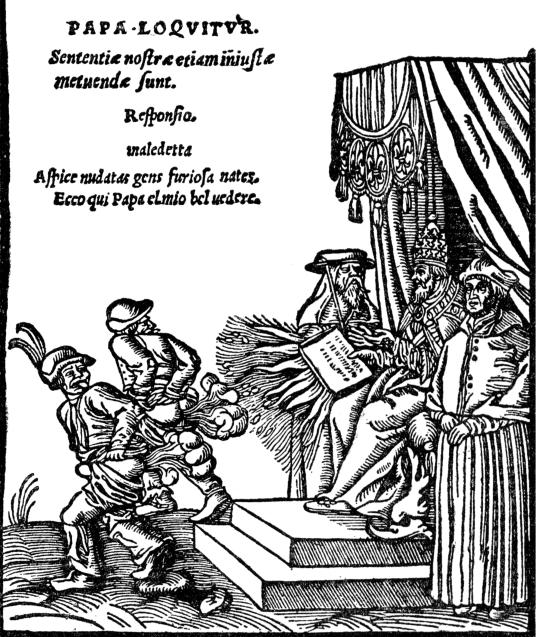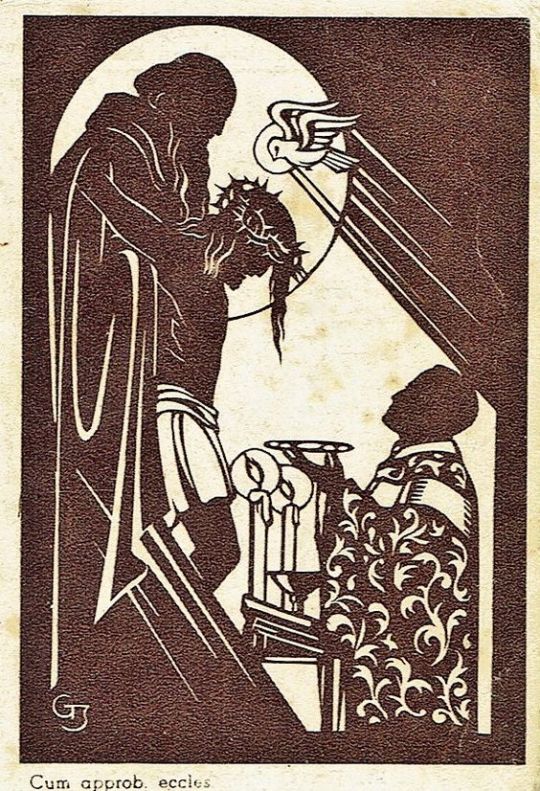Text
Gird your sword upon your hip, mighty warrior!
In splendor and majesty ride on triumphant!
In the cause of truth, meekness, and justice
may your right hand show your wondrous deeds.
Your arrows are sharp;
peoples will cower at your feet;
the king's enemies will lose heart.
Your throne, O God, stands forever;
Your royal scepter is a scepter of justice.
You love justice and hate wrongdoing;
therefore God, your God, has anointed you
with the oil of gladness above your fellow kings.
Psalm 45:4-8

Christ With Sword, Cutting Sin
16 notes
·
View notes
Text

a 1545 anti-papal woodcut depicting German peasants mockingly farting in Pope Paul III's direction. Produced by Lucas Cranach, commissioned by Martin Luther. (x)
The mines of Mansfeld may help explain another of Luther's conspicuous traits — his scatology. His relish for obscenity and toilet language would prove embarrassing to not just contemporary supporters but also generations of Protestants. In his tracts and Table Talk, references to the Word of God and love of Christ appear alongside mentions of farting and belching, asses and excrement. "I have shit in the pants, and you can hang them around your neck and wipe your mouth with it," he said at the table one day. (In many Table Talk editions, such comments are either cleaned up or excised.) Mansfelders, operating in a harsh and unforgiving environment, were known for their crude, blunt language. Luther moreover lived at a time when people were less squeamish about their bodily functions than they are today — when people defecated on roadsides and emptied chamber pots into the street. The fastidious Erasmus was a rare exception. A son of the emerging middle class, he had modern ideas about hygiene, and throughout his life he would wage a lonely battle against the muck and grime of his age.
- Michael Massing (Fatal Discord: Erasmus, Luther, and the Fight for the Western Mind, page 26)
1 note
·
View note
Text
Yes, my child, we must love everyone, regardless of whether or not they love us — that is their business.
from a letter of Saint Ephraim of Arizona
8 notes
·
View notes
Text

"Pray, hope and don't worry. Worry is useless. Our Merciful Lord will listen to your prayer."
Padre Pio; priest, stigmatist, and saint
34 notes
·
View notes
Text
[T]he daily acceptance of whatever happens is the direct intervention of the Holy Spirit.
Mother Angelica (May 17th, 1994)
8 notes
·
View notes
Text

“Ascensão de Cristo” (‘Ascension of Christ’) by Domingos Sequeira, 1828-30
18 notes
·
View notes
Text
Men call me chaste [...] They consider purity of flesh a virtue, though virtue belongs not to the body but to the soul.
Héloïse du Paraclet, in her second post-Calamitatum letter to Peter Abelard, trans. Betty Radice.
Original Latin: Castam me praedicant [...] Munditiam carnis conferunt in virtutem, cum non sit corporis, sed animi virtus.
16 notes
·
View notes
Text

FONS & CULMEN
31 notes
·
View notes
Text
That's the glory of being a man. An ugly face isn't the end of you.
Karen Sirko (Taylor Reid's Daisy Jones & The Six, page 37)
11 notes
·
View notes
Text
I will only repeat what I have said to you long ago: take a reasonable care of your health. You know by this time […] the lesson that troubles of the soul often depend on the state of our bodily health.
George Porter, S.J., the future Archbishop of Bombay, in a letter dated February 20th, 1880
4 notes
·
View notes
Text
The Gospel as Amulet: Thoughts of Three Early Church Fathers
In the early centuries of the Christian community, there are numerous instances in which the gospels themselves were used as objects meant to ward off the powers of evil. Small objects inscribed with the Lord’s Prayer, the incipits of the four gospels, or small passages from both canonical and non-canonical gospels were used as pendants by a host of early Christians. Others hung such objects over their beds or in places of prominence in their houses. These objects were blessed by priests or made by other specialists, seemingly with the purpose of protecting the wearer from danger. What did the early Church Fathers have to say about the practice?
John Chrysostom seems to have been largely neutral towards the practice. He mentions the practice without condemnation, though each time he does so he does it in reference to a practice that he deems to be better.
“Inscribe [the gospel] on your mind! Do you not see how the women and the small children hang Gospels from their necks as a great safeguard and carry them around everywhere, wherever they go? Inscribe the commands of the Gospel and the laws on your mind … And you will have the Gospel as something more secure not by carrying it around on the outside, but inside, storing it in the treasuries of the soul.” (Ad populum Antiochenum de statuis, Homily 19)
“For the scriptures were not given for these reasons, in order that we may have them only in books, rather in order that we may carve them in our hearts … And I say these things not because I am hindering the acquisition of books; instead, I urge this and very much pray for it. But I wish both the letters and the thoughts from them to be carried into our mind … For if the devil will not dare to enter in a home wherever the Gospel may be laying, how much more will he never touch the soul which carries such thoughts around, nor will a demon or nature of sin approach.” (32nd Homily on the Gospel of John)
Jerome seems to have been the most hostile of these three writers to the practice. He specifically links the Christian practice of wearing the Gospel to the Jewish use of tefillin during prayer, calling them both superstitious practices that miss the point of God’s commandments.
“Now the Pharisees did not understand that [the Ten Commandments] need to be carried in the heart, not the body … [Similarly, a]mong us there are superstitious little women who keep doing this up to the present day with little Gospels … They have zeal for God, to be sure, but not according to knowledge.” (Commentary on Matthew Chapter 27)
Augustine of Hippo commends those who use these little gospels instead of the pagan amulets; like most early Christian writers, Augustine was very critical of pagan folk remedies, and Augustine goes a step further by seeing the little gospels as an appropriate symbolic substitute for them. To use the gospel instead of a pagan amulet is an expression of trust in the saving power of Christ over the power of the pagan gods.
“When you have a headache, we commend you if you put the gospel by your head and do not hurry to an amulet. For human frailty has come to this, and men who hurry to amulets must be so lamented that we rejoice when we see that a man, confined to his bed, is tossed by fever and pain and yet has not placed no hope anywhere except that he put the gospel by his head, not because the gospel was made for this but because it has been preferred to amulets.” (Tractate 7 on the Gospel of John)
Source: Robert Matthew Calhoun, “The Gospel(-Amulet) as God’s Power for Salvation”
108 notes
·
View notes
Text
God is, in his ownmost reality, not a monolith but a community of persons. From all eternity [...] God is a family of love, a sharing of life, a breathing in and breathing out, a looking toward another.
Bishop Robert Barron (This is My Body: A Call to Eucharistic Revival, page 35)
4 notes
·
View notes
Text
How can it be called repentance for sins, however great the mortification of the flesh, if the mind still retains the will to sin and is on fire with its old desires? It is easy enough for anyone to confess his sins, to accuse himself, or even to mortify his body in outward show of penance, but it is very difficult to tear the heart away from hankering after its dearest pleasures.
Héloïse du Paraclet, in her second post-Calamitatum letter to Peter Abelard, trans. Betty Radice.
Original Latin: Quo modo etiam poenitentia peccatorum dicitur, quantacumque sit corporis afflictio, si mens adhuc ipsam peccandi retinet voluntatem, et pristinis aestrat desideriis? Facile quidem est quemlibet confitendo peccata seipsum accusare, aut etiam in exteriori satisfactione corpus affligere. Difficillimum vero est desideriis maximarum voluptatum avellere animum.

La Monaca di Monza, by Nicola Consoni, 1861, oil on canvas.
11 notes
·
View notes
Text
Oh, Héloïse, we're really in it now
3 notes
·
View notes
Text
We do not easily think ill of those whom we love most, and the taint of suspicion cannot exist along with warm affection.
Peter Abelard (The Story of My Calamities) trans. Betty Radice
Original Latin: Non enim facile de his quos plurimum diligimus turpitudinem suspicamur, nec in vehementi dilectione turpis suspitionis labes potest inesse.
8 notes
·
View notes
Photo

Holy Mary, Mother Most Humble,
See to it that I may fully submit to your sacred Son.
Come, O Co-Redemptrix, Cause of Our Salvation,
So that my soul, for Christ’s glory, may be yet won.
Mediatrix, standing beside mortifying Cross,
Pray that I have the grace to say “Lord, Thy will be done,”
That I can cooperate with Christ, my sole Deliverance,
And my will, like yours, with His be made one.
And with your aid, my gracious Advocate,
Never again shall I God’s love shun.
26 notes
·
View notes
Text

JESUS CHRIST, SON OF GOD, HAVE MERCY ON ME A SINNER
75 notes
·
View notes